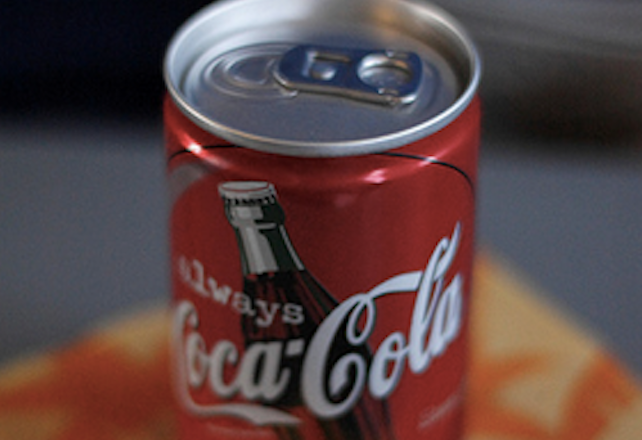Shrinking Soda Cans Mean Fewer Calories For You, More Profits For Beverage Companies
If you’ve taken a trip down the soda (pop, Coke, soft drink) aisle at your local supermarket in the last year you’ve probably noticed an increase of miniature cans being shilled by beverage makers. Although the diminutive cans might look like a novelty, they’re actually Pepsi and Coke’s revenue-producing answer to American’s latest health kick.
The Associated Press reports that both Coke and Pepsi are pushing the smaller cans and bottles as a way to offset falling consumption with packages that cost more per ounce, while still appealing to consumers’ desire for portion control.
The 7.5-ounce mini-cans and 8-ounce and 8.5-ounce glass and aluminum bottles aren’t exactly new to the beverage scene, but companies are now using more aggressive marketing tactics and making the products more widely available.
Representatives for Coke say last year’s “share-a-coke” campaign, which featured printed popular names on cans and bottles, yielded the sale of more than a million mini-cans.
The AP reports that the growing focus on smaller cans signals a shift from beverage makers’ previous stance that success was directly measured by the volume of soda they sold.
In recent years, soda has become somewhat of enemy No. 1 when it comes to America’s fight against obesity. Health officials have often blamed the beverages for making people fat.
Additionally, cities and local governments have proposed an array measures to quell the drinks’ sales, such as imposing taxes on sugary drinks and requiring warning labels for cans.
As a result of such changes, consumption of the drinks has steadily declined in recent years with Americans drinking an average of 450 cans a year. While that seems like a lot it’s a vast improvement from the 576 cans consumers averaged a year in 1998.
The decrease in consumption and growing attacks on such beverages could have easily led to fewer sales for soda makers, but they say the mini-cans have actually helped to offset losses.
Coke’s North American president Sandy Douglas said during a presentation last year that the health and wellness trend currently spreading across the U.S. has set up “a tremendous opportunity for the Coca-Cola brand with our smaller packages.”
According to the AP, the small packages, while offering consumers a less guilt-ridden beverage option, sell on average nine-cents more per can than regular packages.
Douglas said during the presentation that a 12-ounce can of Coke sells for 31 cents, while a 7.5-ounce can goes for about 40 cents, which translates to 2.6 cents-per-ounce for a regular can, versus 5.3 cents-per ounce for the mini version.
Part of the reason for the per-can price disparity is likely due to the size of the packs most people buy soda in. Many consumers now buy traditional canned soda in packs of 12 cans or more, while the mini cans generally sell in packs of eight. Comparing prices at one Philadelphia supermarket, we found a 12 pack of Coke going for $4.99 ($.42/can; $.035/oz) while the only option available for the 7.5-oz mini cans was an 8-pack for $3.99 ($.50/can; $.067/oz).
In all, Douglas said sales of the smaller products were up 9% from January to October 2014.
Beverage industry analysts tell the AP that the moves by Pepsi and Coke to heavily market their miniature products doesn’t seem to be a passing trend.
“It’s responsible and it’s realistic,” Bonnie Herzog, a Wells Fargo industry analyst tells the AP.
She goes on to say that the products often speak to consumers as “moments of pleasure” they don’t have to miss out on.
In addition to pushing the smaller-sized drinks, both Coke and Pepsi have vowed to help cut back on consumers’ consumption of the calorie-filled drinks.
Back in September, the companies, along with Dr. Pepper, announced plans to use their marketing and distribution resources to reduce each American’s consumption of sugary drinks by at least 20% by 2025.
Tiny Cokes: Less Guilt Means More Money for Makers [The Associated Press]
Want more consumer news? Visit our parent organization, Consumer Reports, for the latest on scams, recalls, and other consumer issues.


